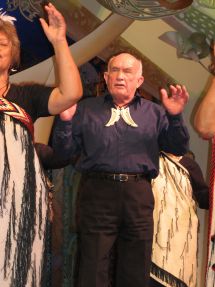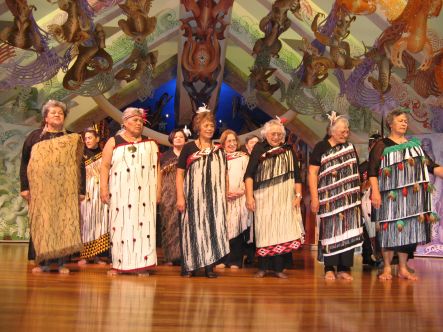Sunday, 6 July 2008
06 Hongongoi (July) 2008
"Ko te reo te mauri o te mana Maori."
The Maori language is the life force of Maori.
Voiced by Justine Murray (Ngai te Rangi/ Ngati Ranginui)
This week's whakatauki is synonymous with the Kohanga Reo movement. As Te Reo Maori faced a decline in the 1960's efforts were made to secure and entrench the language starting with the establishment of the first Kohanga Reo Pukeatua, in the Wellington suburb of Wainuiomata in 1982. And while Te Reo Maori may be more visible then ever, strategies are being implemented that ensure its future. According to Hera Gibson, a Tolaga Bay based Kohanga Reo kaiako, policies devised in Wellington are often at the expense of good sense. Gibson, along with former Maori language Commisoner Erima Henare, Te Reo Maori language advocate Iritana Tawhiwhirangi and Radio New Zealand presenter, Ana Tapiata, were at the launch of Te Ara Tuuaapae, the 25-year strategic plan.
Boutique pop songs is how Anna Coddington describes her kind of sound. Jumping on her dad's drum kit at age 11, it was inevitable she would then pick up the guitar and eventually compose and sing her own material. The drummer/guitarist/singer-songwriter has just released her debut solo album The Lake and is currently touring the length of the country performing her song tracks. Melody Thomas caught up with her as she hit Wellington last week.
We're cuzzie bros in more ways than one with our Pacific Island neighbours - not only do we physically look alike and can understand each others language, there are deeper historical roots that are being celebrated in the upcoming Takitimu festival in Hastings this November. Radio New Zealand's Elma Maua talks with festival organiser Tiopira Rauna.
What was the state of Te Reo Maori in 1979? In an archival recording, John Rangihau and Toby Rikihana discuss the situation starting with the recital of a poem by Harry Dansey. Some 30 years later Te Wiki o Te Reo Maori - Maori language week is a regular fixture. This year it falls from the 21-27 July 2008 and its theme focuses on speaking Te Reo in the home. Te Ahi Kaa will be profiling different events and activities for the month of July starting with a Kaiako teaching her students the Maori vowel sounds.
 For two days at the end of June, Te Papa Tongarewa Museum hosted the Kaumatua Kapa Haka.
For two days at the end of June, Te Papa Tongarewa Museum hosted the Kaumatua Kapa Haka.
The event had Representatives of Iwi from around the motu, the performances paid homage to composers such as Paraire Tumoana (E Pari Ra), Kingi Tahiwi (He Puru Taitama e) and Wi Huata (Tutira mai).
Maraea Rakuraku covers this event with Te Kapa Haka Kaumatua o Te Waipounamu, featuring korero from Aroha Reriti-Crofts and Te Ruahine Crofts.

This week's show featured the following music:
A waiata, Taku Poi, composed by Te Ruahine Crofts in the 1980s as sourced from recordings celebrating Kai Tahutanga.
AEIOU Remix sourced from the Rua Album, by Moana Maniapoto closes the programme.
Poroporoaki
Sam Freedman (1912- 2008)
Lady Rose Henare (1911- 2008)